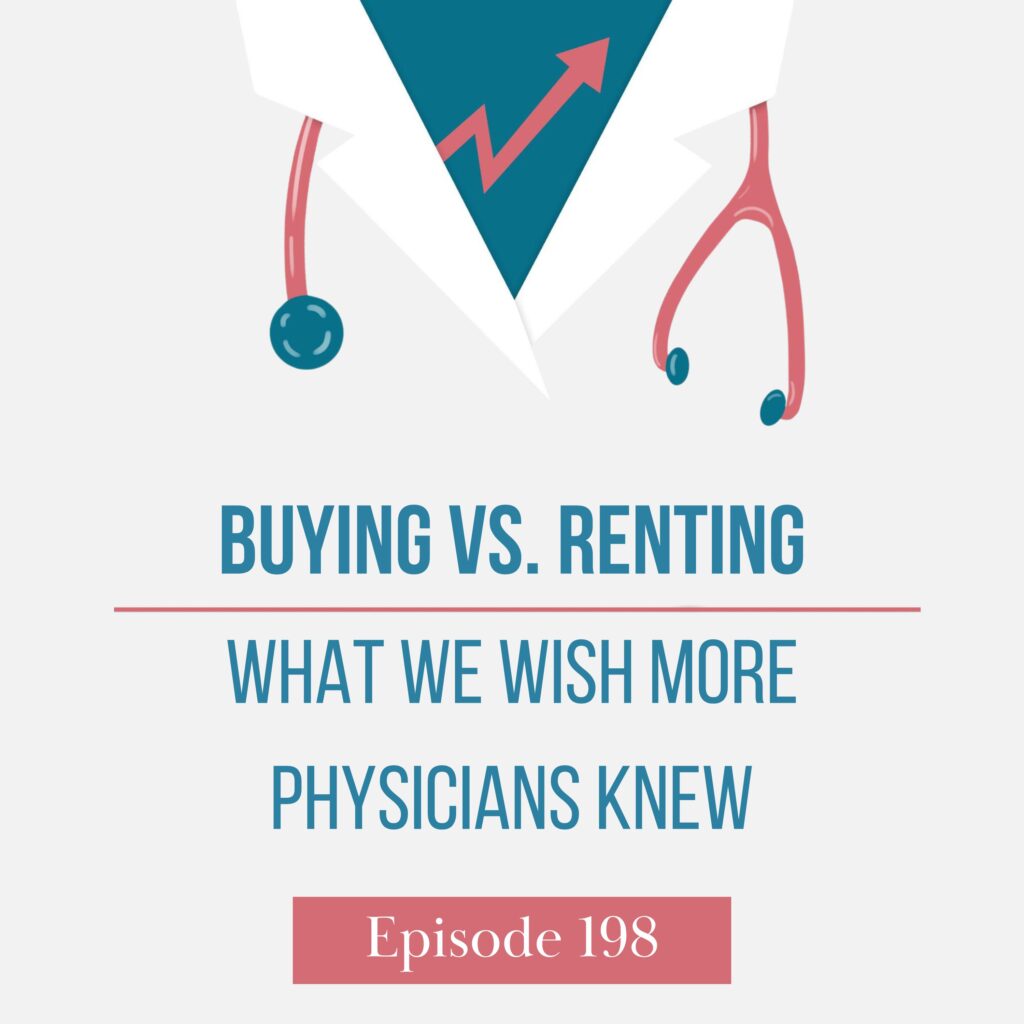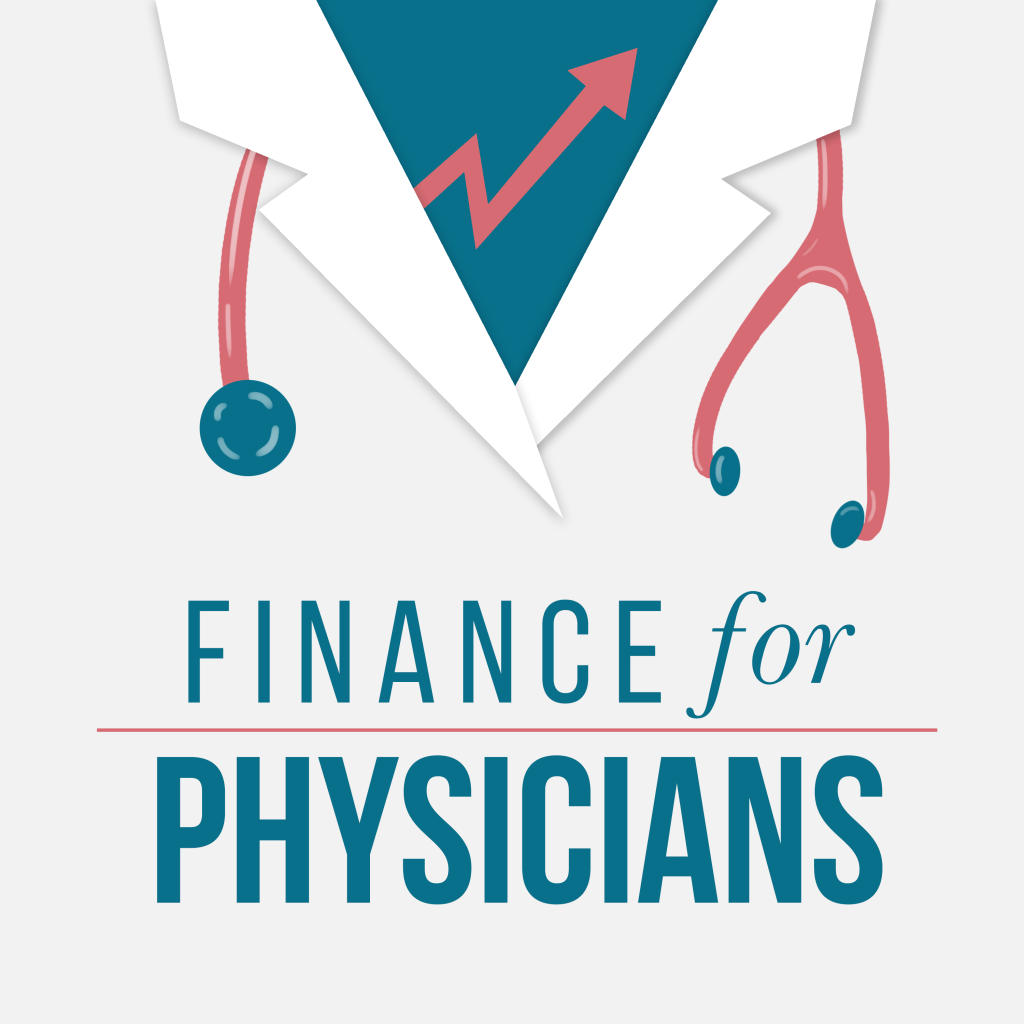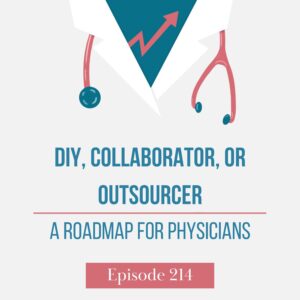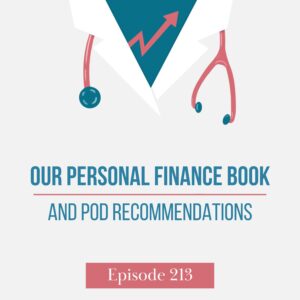Is buying a home always the smarter move—or just what we’ve been told to do?
In this episode, Jennifer Quire joins me to reveal the real pros and cons of renting vs. buying, especially for physicians facing big financial decisions during major life transitions.
Listen in as we dig into how values, lifestyle, flexibility, and unpredictability play just as big a role as the math.
You’ll hear about the side of homeownership that people rarely talk about, what most people don’t factor into the buying vs. renting decision, and why renting isn’t the financial failure it’s often made out to be.
—————————————————————————————————————————
- Sailing with Phoenix
- Connect with me on my LinkedIn
- Contact Finance for Physicians
- Finance for Physicians
- To schedule a call with one of our awesome planners, book HERE.
Full Episode Transcript:
Jennifer Quire: Buying a house is less predictable. You just never know when something’s gonna come up or something’s gonna go out. Then you need to have the time to deal with those issues when the things do go out, like if you and your spouse are both working outside of the home and you have really demanding jobs, who’s gonna be home to meet the plumber or the electrician? Who’s gonna do that?
Welcome to Finance for Physicians, the show where we help physicians like you use money as a tool to live a great life. I’m your host, Daniel Wrenne, and I’ve spent the last decade advising physicians on their personal finances with the mission to help them understand that taking control of their finances now means creating a future where they can practice medicine where, when, and how long they want to.
Daniel Wrenne: Jen, how is it going?
Jennifer Quire: Good. How are you?
Daniel Wrenne: I’m doing good. I know you’ve been really interested in following this guy in the sailboat. We were planning for this show, got into a tangent, a little bit of a tangent about a guy on a boat that I’m learning about for the first time. I’m not in the know, I guess, about these unique news stories, but.
Jennifer Quire: Daniel’s not an Instagram guy.
Daniel Wrenne: I am not on social media. As maybe you’ve noticed on my social media, I don’t reply. I’m sorry if I don’t reply. I’ve gone off social media completely. Anyway, I was intrigued by your story about the guy sailing, and I was like, let’s see if we can make that a segue into the conversation we’re gonna have today.
Jennifer Quire: Always great for a good tangent. If you don’t know what we’re talking about, it’s called Sailing With Phoenix. It’s this guy who just got fed up with the grind. And he is like, “I’m gonna quit my job and liquidate everything and sell everything except my cat. I’m gonna buy a boat and I’m gonna figure out how to sail around the world.”
And he did it, and right now… What?
Daniel Wrenne: He’s doing it, right?
Jennifer Quire: He’s doing it, yes. So he’s, his first big journey was to leave Oregon to go to Hawaii, which he, I guess depending on the weather conditions and everything he was expecting was gonna take 20 to 30 days. And I think we’re like, I think yesterday was day 18.
Daniel Wrenne: You can tell Jen’s all in on it. She’s saying “we’re.”
Jennifer Quire: Yeah, we’re, I’m a part of this journey. We’re friends. Yeah, I was just telling Daniel that last night, he seemed to have gotten off course a little bit, so everyone’s like, “Hey dude, are you good? Did you go off course a little? You need some help?” But sure there’s just something he’s going around.
Daniel Wrenne: I think the segue is that it’s not all about the numbers. Clearly, this guy, I don’t even know his name. Phoenix is his cat’s name, right?
Jennifer Quire: His Cat and Boat. His name is Oliver.
Daniel Wrenne: Oliver and Phoenix. Clearly, he’s not doing this for the numbers, although it sounds like he’s starting to make some money on it, but he definitely did not do this for the numbers.
So we’re gonna be talking about a very big decision. Yeah, everybody’s gotta make, I guess if you’re living in a home, you gotta make this decision is, and a lot of times we get into the numbers, but it’s not all about the numbers and that’s the big rent versus buy decision. And I think a lot of people, get this wrong, depending on circumstances.
A lot of people get it right. But we’re gonna be talking through that decision and how you can make it, I mean, we wanna make it about the numbers, but you want to be like Oliver in Phoenix where you can, maybe not that extreme, but we can…
Jennifer Quire: You have some sort of flexibility to pivot if you decide, you know what?
Daniel Wrenne: Yeah, so we were also saying we’re like, hopefully Oliver was renting.
Jennifer Quire: Yes.
Daniel Wrenne: Because I think you said he had a very high a dream that he wanted to do this forever. And if we worked with someone that was like, I got a dream, I wanna sail around the world. And I am not sure when I’m gonna do it.
Hopefully, pretty soon while I’m young, we would probably be like, maybe you ought to think about renting your house.
Jennifer Quire: Maybe you should not lock yourself into this.
Daniel Wrenne: Yeah. I think renting, so renting versus buying. When everybody seems to gravitate towards buying, I think the general consensus is in like the culture is that buying is best. Like it’s the American dream to own a home and all that. And I think the general consensus is that everybody should buy as soon as they’re able to financially speaking. And that it always makes sense to buy versus rent. Is that correct?
Jennifer Quire: I think so, and it’s not only that there’s this idea being pushed that you have to buy a house.
It’s also that renting is bad. So it’s like we have to avoid renting, so we have to buy a house. Like it doesn’t feel like people are looking at it as a choice or a decision sometimes.
Daniel Wrenne: Right. Then the next thing to think about is if that’s accurate, is that the right thing to do is to fall in line with that?
Jennifer Quire: Yeah, well, I think it’s backing up and comparing the pros and cons and when does it make sense to look at renting versus when does it make sense to look at buying? Because that can be circumstantial based on what phase of life you’re in or do you know where you wanna live, at least for the foreseeable future? Or sometimes it even depends on the market that you live in.
So I think it’s more important than people think to look at your renting versus buying options.
Daniel Wrenne: So we can for sure say in some instances that’s completely terrible advice, or falling in line with the always buy consensus makes no sense for certain people, but it makes a ton of sense for other people.
So what are the factors? What are the big factors? How do I know if I’m in one or the other, or start to get an idea of if I’m in one or the other?
Jennifer Quire: Yeah. Yeah. So I would, if I’m having a conversation with a client or even using myself as a case study, ’cause my husband and I just went through this, I think it can make more sense to buy when you can find what you want and it’s within budget. It’s not gonna throw off your other goals, if your situation’s relatively stable. Your income is pretty fixed. You’re not expecting any huge changes in your circumstances. You’re committed to an area or a job or you’re pretty safe to say, “Hey, I’m gonna be in this area for probably at least the next five years.” I think you need to have flexibility in your cash flow to deal with unexpected things.
Buying a house is less predictable. You just never know when something’s gonna come up or something’s gonna go out. Then you need to have the time to deal with those issues when the things do go out. Like if you and your spouse are both working outside of the home and you have really demanding jobs, who’s gonna be home to meet the plumber or the electrician, or, who’s gonna do that?
Daniel Wrenne: Like needing a new roof and training might be a stretch for some people. Or if you don’t have an emergency fund. Or a reserve fund for the house, and you need HVAC, or the house floods, and an insurance deductible on the flood is $10,000 or whatever.
Jennifer Quire: Yeah. And you wanna be able to shop more than one person, but you can’t take all of that.
Like you can barely have the time to do it with one person. You can’t shop three different people to make sure you’re getting the best price. So it’s…
Daniel Wrenne: Right. Or my neighbor told me yesterday, they’re like. They got this tree that’s maybe dying, maybe not. And they’re like, I got the first quarterback. You won’t believe how much it was.
Jennifer Quire: Trees are insanely expensive.
Daniel Wrenne: $8,500 to remove the tree. And this is one tree of 30 in their yard. They have a ton of old big, huge trees in their yard. So it’s like…
Jennifer Quire: And it’s like you have to do this, or if it’s gonna fall through your roof, like you can’t not remove the tree. So.
Daniel Wrenne: Yeah. The ability to deal with those things.
Jennifer Quire: Yeah. And then if you don’t, or you value things like predictability in a budget or the area you live in, homes are super expensive. If you are in a really dynamic situation where maybe jobs are changing, or family situation is changing, or other things are up in the air and make it harder to plan, you’re not necessarily committed to a specific area, or you just don’t wanna take the time to have to be the person who calls the plumber. You just want someone on call to be your plumber and be the person who fixes it. Just the convenience aspect of renting sometimes.
Daniel Wrenne: Yeah, so I think those are all really good points, none of which really get into the numbers, I guess.
The thing about most physicians is you guys can afford a lot of house typically, and so you can afford to buy instead of rent, almost always. So the numbers are important, but I think first thing is to look at some of those big factors like, where are you at in your life? How stable are you?
How stable will you be in the future? Like the classic example I see is “I’m transitioning into practice and moving to a new area. I’ve never been there before. I’m not sure about the job. My financial position is not great yet, will be in the future, but it’s not quite solid yet now, and…”
Jennifer Quire: “They’ve told me that I’ve guaranteed income for the first two years, and then it goes to production base, so it’s going to double. So let’s plan based on that.”
Daniel Wrenne: Yeah, that sounds dicey to me. I would be like, “Woo.”
Jennifer Quire: Yeah.
Daniel Wrenne: I don’t know about, not even about budget. I would be like, I don’t know about buying period, because you can rent a place for a year. I know it’s a headache to move and you don’t want to move, but it’s a bigger headache to not love the job and you might be in a position where you’re gonna have to move either way.
Especially in that scenario we just described, there’s a pretty fair amount of people that it doesn’t work out. It’s not tiny. It’s definitely, I don’t know the stats, but my guess is 10%, maybe higher of first jobs in practice don’t work out and typically require some sort of move.
And so that’s not tiny. That’s a pretty substantial percentage. And nobody says they’re gonna do that going in.
Jennifer Quire: Yeah. No one gets married thinking they’re gonna get divorced, like it’s just one of those things that happens.
AD BREAK
Daniel Wrenne: Let’s take a quick break to talk about our firm, Wrenne Financial Planning.
The goal of our podcast is to empower you to make better financial decisions, but sometimes the best financial decision you can make is to work with someone who understands your financial goals and has the expertise to keep you on track to reach them. That’s where Wrenne Financial Planning comes in. We are a full-service financial planning firm that works with over 400 physicians and their families across the country.
We charge a transparent monthly flat fee for our services and offer virtual meetings you can take from anywhere. Best of all, you’ll get to work with a team that specializes in working with physician families. So whether you’re starting out and wondering how you’ll balance your student loan payments and saving for a home, or you are an established physician trying to figure out how to pay for your kid’s college and how much you need to save to reach financial freedom, we can help.
I’ll put a link in the show notes to schedule a no-obligation meeting with one of our certified financial planners. Wrenne Financial Planning LLC is a registered investment advisor. For more information about our firm, please visit wrennefinancial.com. That’s W R E N N E financial.com.
AD BREAK END
Daniel Wrenne: Well, on the other hand, if you’re like, I’m staying in the area I did training in and I have like me, my wife is from Lexington. There’s no way we’re going to any other town. She would not—
Jennifer Quire: Her family lives here, yeah.
Daniel Wrenne: —Entertain that option. The family’s here. We have a good down payment and we’ve got the reserve account and our finances are in good order and it’s within the budget, and we got a financial plan that’s rock solid that like it fits all into this, it meets our needs and all the things that’s like, yeah, you’re might as well buy.
It’s a great decision and it’s a reasonable cost of living too. That’s another big factor you mentioned.
Jennifer Quire: Yeah. Yeah.
Daniel Wrenne: So yeah, those are good points. But the math, so what about the math?
Jennifer Quire: The math is equally as important. I think we wanna consider the more intangibles, the qualitative things, but the quantitative things can help inform that decision. And what I think is important to look at is so what my husband and I did as an example. So we owned a home in Lexington and when we decided to move home to Colorado, we went through this exercise of what’s important to us and where we wanna live. So we made a list of this, this this.
We need this much space. We wanna be in this area. All that. And so we looked at what can we rent for that and what can we buy for that. And then what we can rent for that was about $6,000 a month. And that sounds like a lot of money, but what we can buy for that with the same hits, the kind of non-negotiables that we have, that level of home was gonna cost us about $13,000 a month.
So it’s…
Daniel Wrenne: What were the examples of the non-negotiable type things you all wanted?
Jennifer Quire: Let’s see. Let me go back to my list here.
Daniel Wrenne: Like two bathroom or two bedrooms?
Jennifer Quire: Yeah. Three bedroom, two and a half bath. We wanna be able to see the mountains somewhere. We wanna be somewhere—
Daniel Wrenne: She lives in Boulder, by the way.
Jennifer Quire: Yeah, I’m in Boulder, Colorado. We wanted 1800-ish square feet, so we use that when we plug that into our—
Daniel Wrenne: Free coffee?
Jennifer Quire: Yeah, free coffee. Unfortunately not included anywhere if you own it probably, but yeah. So we essentially plug those filters into our Zillow search. And what pops out is, you’re gonna pay at least 1.3 million for kind of what we were looking for. And that’s rare.
Even 1.3 is low. There’s probably something wrong with that house.
Daniel Wrenne: And that’s for a fixer-upper?
Jennifer Quire: Yeah. Yeah. It’s gonna need probably some work, which is also not something I’m interested in doing. And we’re in a phase of life where we don’t really know where we wanna be.
We are just flying by the seat of our…
Daniel Wrenne: We might be sailing across around.
Jennifer Quire: We could be sailing across the world and.
Daniel Wrenne: On a whim, with your cat.
Jennifer Quire: From the middle of Pacific Ocean, thanks to Starlink.
Daniel Wrenne: Yeah, I’m glad we brought it back to that.
Jennifer Quire: Yeah.
Daniel Wrenne: So that seems like a pretty straightforward deal.
But what if I’m like I can afford whatever you were saying, the 1.3 million and I really wanna buy a house. Is that reasoning enough if you could afford a lot more and get it done?
Jennifer Quire: I think then it comes back to the values part a little bit more. Yeah, I think it’s important to understand the numbers and if that $13,000 a month fits into your plan, meaning that you have wiggle room to do other things, you can save what you need to save.
You can travel, do whatever you want to do, take care of the kids. Then by all means, if that fits into your budget, you’re gonna be here for a while. Things are stable for you. Our income’s not gonna change in a couple years and put us in a tough spot then absolutely. Then maybe buying a home makes sense for you.
But I still think it’s important to look at both and compare and understand the options that are out there going with eyes wide open.
Daniel Wrenne: Yeah. Then I think the buying numbers are—I live in Lexington, Kentucky, and Jen lives in Boulder, and they’re like the most polar opposite markets you could probably think of in terms of real estate. So…
Jennifer Quire: They’re the opposite.
Daniel Wrenne: Yeah, so Lexington, totally different situation. You still might make sense to rent in Lex in Lexington, Kentucky, but.
Jennifer Quire: Oh. Ironically you say that. That search is what sent us to Colorado. We started looking at, we don’t know, we’re kind of over this house thing.
Like it’s taking so much of our time. It’s really expensive. It’s hard for us to budget month to month because sometimes we have this thousand dollars thing that creeps up, and I like predictability. Like I’m a planner. I like predictability.
Daniel Wrenne: That’s funny ’cause y’all had a very efficient home in Lexington, Kentucky.
Jennifer Quire: It’s a brand new home.
Daniel Wrenne: It was brand new. It was super low interest rate. It appreciated a bunch. The all-in cost was lower than—but it was a headache, it sounds like was more the unpredictability and the headache.
Jennifer Quire: Yes. And then after, you’re in a house for six years and then the design trends change and you’re like now I wanna redo the kitchen.
I wanna redo this. And I’m like, I don’t wanna sink $50,000 into this. So then I was like what if we just rented something that is like what we want? And so we started looking into the rental market in Lexington and throwing it out that we bought at a really good time. We had really low interest rate.
Lexington is cheap. I think our monthly mortgage payment, PITI, was like $1,200 a month. Like it was incredibly low. But we found a place that we thought would be fun to live more walkable, nice, good amenities. It’s like $3,600 a month. That one is much harder to justify, like own a home for $1,200 a month, at least not all in, or rent a place for $3,600 a month.
Like that calculation doesn’t make sense.
Daniel Wrenne: Yeah, Lexington, from a number standpoint, it is much harder to justify renting instead of buying. But like you said, going back to the values part, if you really do need the flexibility, ’cause it is a headache to keep up a house, it’s also a headache. If you gotta leave quick, it’s a headache to own a home, especially if the market turns south.
Jennifer Quire: We’ve seen that happen. I think we’re in a unique period, especially people our age, I think have this recency bias that housing always goes up. But I have a handful of examples where people got into a house, it was not the right decision, and then they had a very hard time selling it and lost money.
Daniel Wrenne: Right. We’re wrapping up. So mistakes. We were gonna talk about the most common mistakes too. We’ve hit on a few of them, kind of intertwine them into conversation, but I know there’s a couple more we can throw out. That’d be really good to think about.
Jennifer Quire: I think the biggest one is people when they wanna buy a house, usually the first thing they do is they go online and they Google like, how much house can I afford?
Or what will my mortgage payment be? And it usually only shows you principal interest, sometimes taxes, insurance. But what it doesn’t show you is your maintenance costs and your time costs, and the stress of the unpredictability of the budget. There’s a lot of intangibles that come along with owning a home that people don’t think about.
And I think maintenance costs get underestimated a lot.
Daniel Wrenne: That one is the most underestimated of all of ’em. We’re not even talking about improvement, we’re talking about lifetime maintaining the house at its current standard of living, which is like functional. So like regularly updating the paint, ’cause paint doesn’t last forever. Or the roof.
Jennifer Quire: Changing your filters every quarter and they’re like $200 a month.
Daniel Wrenne: The tree removal, tree trimming all the…
Jennifer Quire: The lawn.
Daniel Wrenne: The sidewalk gets cracked and you gotta do a new sidewalk. Or the driveway repair. And you can tell people that haven’t budgeted for their house for that kind of thing, and they just maybe people that can’t afford it to, but sometimes they let the house go a little bit and you can tell when a house is not being maintained, I guess is what I’m trying to say. That’s a issue.
Jennifer Quire: But a lot of times what people will do is they’ll say, I’m spending $3,000 a month in rent now and I ran this calculator, says my principal and interest is $3,000 a month. That’s the same thing. And I’m like, those are actually wildly different things.
Daniel Wrenne: Yep. Taxes and insurance you gotta get for sure.
And then what’s a good rule of thumb for maintenance? Maintenance costs will vary depending on the age, I mean over the life of a house I think you can get a pretty good estimate.
Jennifer Quire: Yeah. Yeah. I think what is it the experts say like one to 4% with one big, yeah. Maybe it’s a brand new home, four being, it’s an older home, but probably somewhere in the middle 2% to 3% of your home value a year.
So if can just do the math on the 2% to 3%.
Daniel Wrenne: I bet if you do the math, it’s way more than you expect. I’m just betting most people if you do the math, so if your house is a million-dollar house, so we can keep the numbers round. And you say 2% of that, that’s $20,000 a year, is that right?
Jennifer Quire: Yeah.
Daniel Wrenne: Yeah. $20,000 a year of baseline maintenance, not improvements. So yeah. Don’t forget those maintenance costs.
Jennifer Quire: Yep.
Daniel Wrenne: Any other big mistakes?
Jennifer Quire: I mean, transaction costs of buying and selling, like that’s another thing on top of, even if you make a little bit of money on your home and you gotta turn around and sell it quickly, that’s gonna be absorbed in the transaction cost of selling the house.
Daniel Wrenne: Yep. Awesome. Okay. It’s been fun and I feel more enlightened about the sailing guy. All of it.
Jennifer Quire: Yeah. Are you gonna sell your house and sail around the world with Allison and the boys?
Daniel Wrenne: No, I’d like to stay married, so that would not be…
Jennifer Quire: I don’t think they would be psyched about that.
Daniel Wrenne: I would think, yeah. Not possible.
Jennifer Quire: She’s like, I’ll be here. See you when you get back.
Daniel Wrenne: Yeah. No, there will be no seeing me when I get back. You’re on your own, brother.
Jennifer Quire: Yep. Enjoy.
Daniel Wrenne: Yes. All right, well, good catching up, and we’ll see you next time.
Jennifer Quire: Sounds good.
No guests or clients appearing on the podcast received any form of compensation for their appearance and obtained no other benefit from us. It should not be assumed that every client has had the same experience.









